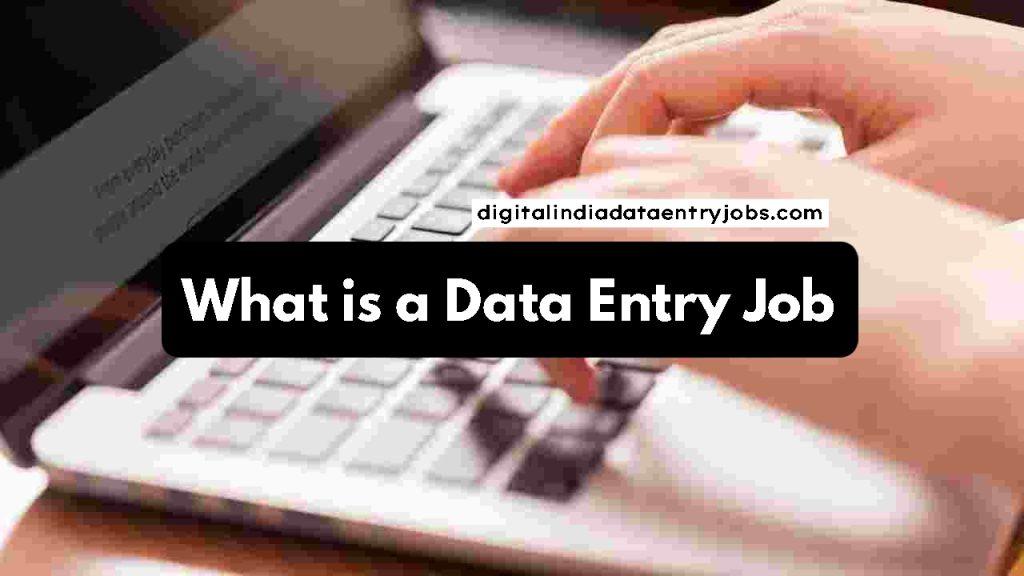How to Get a Data Entry Job:- For those looking for work-from-home options, data entry positions can frequently be a wonderful fit. Entry-level jobs may simply require a computer, rudimentary typing skills, and clerical knowledge—no experience is necessary. If you’re looking for flexible employment, you might want to read these helpful recommendations to help you locate a data entry job that works for you.
This page defines data entry jobs, describes how to locate data entry jobs locally, provides examples of employment that fit the role and goes over the necessary training and industry advice for this profession.
Contents
What are data entry jobs?
Work involving the entry of various sorts of data into databases, programs, and electronic forms on behalf of an organization or client is known as data entry. They occasionally scan physical copies of documents, including invoices, reports, and client files, into computer files. Even pasting audio and video files into programs or copying them are possible tasks in some workplaces.
In addition, data entry clerks can scan documents, update data, delete files, check the correctness of information in papers, organize data into spreadsheets, and carry out other secretarial tasks. Working for a range of clients, you can be an independent contractor, part-time worker, or full-time employee.

Also Read:-Google Data Entry Work, indnewsupdates.com, Digitizeindiagov
How to find data entry jobs in your area
How to Get a Data Entry Job
You can typically follow these recommendations to discover a position that fits you, while the exact procedure may differ based on your region and experience level:
1. Gain experience
Finding out whether qualifications and talents meet the position’s requirements is the first step in applying for a data entry job. Although these frequently differ between organizations, most look for applicants with a high school education as well as proficiency with computers, communication, organization, and typing. Take into consideration picking up skills in using word processors, spreadsheets, databases, and slide shows. You could try using these programs yourself and seeing internet tutorial videos.
Seek positions such as the following to obtain professional data entry experience with pertinent duties and technologies:
- Receptionist
- Office Assistant
- Virtual Assistant
- Scheduler
2. Improve your typing skills
Developing your typing abilities is an additional means of gaining experience for your position. Since spell check software is rarely compatible with numbers, this entails increasing your typing accuracy overall. Data entry professions usually contain more numbers than words, such as codes, prices, and phone numbers.
Transcribing books, newspaper articles, poems, and other types of texts is a good approach to practice typing more quickly and proficiently. Typing classes may also be offered by community colleges and community centres. To gauge and enhance one’s typing accuracy and speed, there are a plethora of free typing websites available.
2. Create or update your resume
Displaying your attention to detail—a critical ability for data entry—on your CV requires refinement. Emphasize your typing, computer, accuracy, and related skills when building or revising your resume. Give a brief explanation of any computer training, secretarial work, or other relevant professional experience you have, then start with your most recent employment history. To highlight your accuracy and experience managing large-scale data projects, use bullet points to outline your work responsibilities and include particular metrics.
3. Look for local listings
Take into consideration browsing local job postings first when starting your employment hunt. Some businesses might employ people for data entry tasks that need in-person interaction. You might visit nearby employment agencies or peruse the classified advertisements in the newspaper. Positions for local data entry workers in your area may also be listed on websites that concentrate on personal advertisements or service requests.
4. Research remote data entry jobs
There are many of internet jobs available if you would want to work from home. Choosing this option could help you cut your journey and save money on petrol. If you’re looking for online data entry employment, try browsing job boards. There can be more competition for work-from-home positions because of their increased popularity.
To narrow down your search, think about utilizing the filters on these sites. You may select “work from home” or “remote,” for instance. When examining distant listings, confirm the company’s credibility before providing any personal information to guard against bogus postings.
5. Consider earning a certification
You could learn about common platforms for data input tools by enrolling in one of the many certification courses accessible. Typically, these courses give you education, tools that you can download, and real-world experience. In order to enhance your abilities, some organizations also provide free training. Training in the following fields should be considered:
- Microsoft Office
- SQL
- Research
- Basic accounting
- A certificate from an organization recognized by the American Association of Electric Recorders and Transcribers (AAERT) can be of interest to you if you’re hoping to work in a specialized field such as law or healthcare.
6. Search for work through a temp agency
Consider working with a temp agency if you would prefer temporary employment or a side gig as a data entry professional. Most of the time, these agencies can put you in touch with a company looking to hire temporary workers.
You typically gain more experience for your resume when working as a temp. You can be required to finish a skill evaluation, like a typing or software test, by these organizations. Employers can frequently observe your proven skill and passion through these evaluations.

How to find data entry jobs in your area: Types of data entry jobs
Consider the following examples of data input job titles:
1. Typist
Primary responsibilities: Typists type business papers and materials, including contracts, emails, reports, spreadsheets, and training materials, using word processing software. Along with entering data into databases and files, they also have to edit their work for correctness and listen to audio materials and meetings.
2. Data entry clerk
Primary duties: The main responsibilities of a data entry clerk include entering vast amounts of data into databases, papers, and business systems. They might import data from external sources into corporate systems, confirm that all data is accurate, and put backups and security measures in place to reduce the chance of data loss.
3. Data processor
Chief responsibilities: Data processors are administrative experts who examine, enter, handle, and arrange data. They make decisions about which data to use, why it’s important, and where to send it, reporting to data controllers. For businesses like finance, healthcare, and manufacturing, they might then collect, organize, process, and safeguard data.
4. Transcriptionist
The primary responsibilities of a transcriptionist include writing up audio recordings from meetings, court cases, appointments, podcasts, classes, instructional materials, and interviews. They type the spoken words while listening to audio recordings. Industry jargon can be interpreted by specialized transcriptionists, such as those working in the legal or medical fields, to guarantee that clients comprehend the material.
Also Read:- HMIS Data Entry Format, Uidaionlineaadharcard, Nebsit Council
Skills required for data entry positions
Here’s a list of essential abilities you need to carry out your everyday tasks:
Computer skills
Strong computer abilities are necessary for data entry jobs since you’ll be utilizing these devices to finish tasks and interact with superiors and coworkers. These abilities could be useful for using an antivirus program to guard against online threats, updating your operating system, installing and updating software, and managing a computer.
Learning how to use word processors, spreadsheet software, and databases, such as Microsoft Excel, may also be beneficial. To complete your work, certain companies might need you to utilize particular browsers and applications.
Typing skills
In order to enter data into the necessary programs and fields quickly and effectively, data entry jobs usually demand excellent typing abilities. In order to guarantee that workers achieve productivity standards, certain organizations could demand them to operate at a specific word per minute (WPM) rate. Maintaining precision while working is another aspect of typing abilities. To avoid any spelling, punctuation, or numerical errors, make sure you proofread your work before submitting it.
Organization
Excellent organizational abilities are frequently necessary for those in data entry jobs in order to plan, prioritize, and accomplish daily goals more quickly. Having good organizational abilities might also help you concentrate and accomplish more tasks in less time. Creating timetables and organizing your workstation are a couple of these abilities.
Research
For specific projects or businesses, some data entry clerks conduct small-scale research and data collection. material from interviews, market research, laboratory tests, and material from online databases or libraries are some examples of the types of research that can be conducted. Knowing the different kinds of sources that are out there, recognizing research problems, obtaining accurate information, evaluating data, and utilizing accessible methods and resources are a few instances of research skills.
Communication
Writing letters on behalf of others is a common requirement in data entry jobs, therefore communication skills are essential. It’s crucial that you are able to compose a suitable message even if you are unable to identify the precise wording used in the original source material. For instance, you must be able to articulate the meaning of the conversation in detail if you are transcribing a business meeting and there are brief moments in your audio recording that are not clear.

Also Read:- Fiverr Data Entry, Companycontactdetail, scholarships gov
Tips for finding data entry jobs
Here are some pointers that could enable you to acquire the job you want:
- Make your CV unique to each job posting. It’s a good idea to tailor your resume to include the precise keywords and qualifications listed in the job post before submitting each application. This could assist you in sorting through previous applicant tracking systems (ATS), which are programs that businesses frequently utilize to separate applications with certain data.
- Before applying, do some research on the companies. It’s crucial to do your homework on a company before applying in order to confirm its credibility. Certain job advertisements contain links to phony chances, so search for a career-related social media page, website, or profile and check the content to be sure it’s accurate.
- Make connections with other experts in the field. Communicate with your coworkers and managers while you hunt for and accept a data entry job. You might meet and become friends with people who know of positions that are more permanent or advanced.
#Saras

